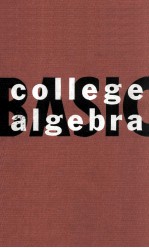
0 SOME BASIC CONCEPTS 1
0.1.Introductory remarks 1
0.2.Sets and subsets 5
0.3.On the logical method 11
1 NUMERICAL SYSTEMS 19
1.1.Natural numbers 19
1.2.Systems of numeration.Decimal scale 20
1.3.Addition of natural numbers 22
1.4.Multiplication of natural numbers 26
1.5.Multiples and divisors 31
1.6.Prime and composite numbers 32
1.7.Greatest common divisor and least common multiple 34
1.8.Number bases 37
1.9.Rational fractions 41
1.10.Operations on fractions 42
1.11.Decimal representation of fractions 47
1.12.Concepts of irrational numbers 49
1.13.Summary 52
2 THE SYSTEM OF REAL NUMBERS 55
2.1.Introduction 55
2.2.Field properties of real numbers 59
2.3.Summary 62
3 OPERATIONS ON SIGNED NUMBERS 65
3.1.Some order properties of real numbers 65
3.2.Addition of signed numbers 68
3.3.Subtraction of signed numbers 71
3.4.Multiplication of signed numbers 73
3.5.Powers of signed numbers 75
3.6.Summary 77
4 ALGEBRAIC EXPRESSIONS 81
4.1.Constants,variables,and parameters 81
4.2.Algebraic expressions 82
4.3.Degree of a polynomial 84
4.4.Numerical value of an algebraic expression 85
4.5.Ratio and proportion 88
4.6.Summary 93
5 FUNDAMENTAL OPERATIONS ON POLYNOMIALS 95
5.1.Introduction 95
5.2.Addition of polynomials 95
5.3.Subtraction of polynomials 96
5.4.Multiplication of polynomials 99
5.5.Division of polynomials 101
5.6.Factoring polynomials 106
5.7.Special products 108
5.8.Simple types of factoring 110
5.9.Special devices 112
5.10.Factoring the general quadratic trinomial 114
5.11.Summary 116
6 RATIONAL FRACTIONS 119
6.1.Definitions 119
6.2.Reduction of fractions 119
6.3.Addition and subtraction of fractions 121
6.4.Multiplication and division of fractions 125
6.5.Complex fractions 127
6.6.Summary 130
7 EXPONENTS AND RADICALS 133
7.1.Introduction 133
7.2.Rational exponents 133
7.3.Laws for radicals 137
7.4.Operations with radicals 140
7.5.Real exponents 143
7.6.Irrational algebraic expressions 146
7.7.Summary 149
8 RELATIONS AND FUNCTIONS 155
8.1.Some properties of complete ordered fields—the real number system 155
8.2.Geometric representations of the real numbers 157
8.3.Coordinates of points on a line 160
8.4.On the language of sets 163
8.5.Cartesian coordinates of points in a plane 165
8.6.Relations 166
8.7.Identities and equations 170
8.8.Linear equations 171
8.9.Functions 178
8.10.Variation 182
8.11.Summary 186
9 COMPLEX NUMBERS 189
9.1.Introduction 189
9.2.Equality of complex numbers 190
9.3.Operations on complex numbers 191
9.4.Absolute value of complex numbers 197
9.5.Square roots of complex numbers 200
9.6.Geometric representation of complex numbers 203
9.7.Euclidean coordinate geometry 205
9.8.Summary 208
10 ALGEBRAIC EQUATIONS 211
10.1.Introduction 211
10.2.Transformation of equations 212
10.3.Solution of linear equations 220
10.4.Solution of quadratic equations 223
10.5.Some properties of the roots of quadratic equations 226
10.6.Equations of higher degree 232
10.7.Summary 232
11 MATRICES,DETERMINANTS,AND SYSTEMS OF LINEAR EQUATIONS 237
11.1.Matrices 237
11.2.Different types of matrices 238
11.3.Equality of matrices and operations on matrices 240
11.4.Systems of equations 246
11.5.Solution of a system of linear equations by addition and subtraction 249
11.6.Systems of linear equations in matrix form 254
11.7.The inverse of a square matrix 258
11.8.Determinants 261
11.9.A formula for the inverse of a square matrix.Cramer's rule 265
11.10.Summary 270
12 PROPERTIES OF POLYNOMIALS IN ONE VARIABLE 275
12.1.Introduction 275
12.2.Theorem of the remainder 276
12.3.Divisibility 277
12.4.Factored form of the polynomial 279
12.5.Polynomial identities 282
12.6.Method of undetermined coefficients 283
12.7.Synthetic division 285
12.8.Polynomials expressed as polynomials in x—k 289
12.9.Summary 291
13 SOLUTION OF REAL NUMERICAL POLYNOMIAL EQUATIONS 295
13.1.Introduction 295
13.2.Upper and lower bounds of the roots 295
13.3.Descartes' rule of signs 297
13.4.Graphs of polynomials 299
13.5.Locating real roots 303
13.6.Rational roots of an equation 307
13.7.Irrational roots.Horner's method 311
13.8.Summary 316
14 SYSTEMS OF HIGHER DEGREE EQUATIONS 319
14.1.Introduction 319
14.2.Method of adjunction 322
14.3.Graphical interpretation 326
14.4.Problems involving systems of equations 332
14.5.Summary 336
15 INEQUALITIES 339
15.1.Introduction 339
15.2.Absolute inequalities 339
15.3.Conditional inequalities 342
15.4.Summary 349
16 SEQUENCES AND SERIES 353
16.1.Introduction 353
16.2.Arithmetic progressions 354
16.3.Harmonic progressions 357
16.4.Geometric progressions 358
16.5.Infinite geometric series 361
16.6.Summary 365
17 APPROXIMATIONS AND LOGARITHMS 369
17.1.Introduction 369
17.2.Intervals 370
17.3.Absolute and relative errors in approximations 372
17.4.Trustworthy and significant digits 374
17.5.Determination of the trustworthy digits of an approximation 376
17.6.Precision and accuracy of approximations 379
17.7.On the arithmetic of approximations 380
17.8.General method of calculation with approximations 380
17.9.Logarithms 384
17.10.Common logarithms—base 10 388
17.11.Some uses of common logarithms 391
17.12.Change of base of logarithms 394
APPENDIX:ON THE FOUNDATIONS OF ARITHMETIC 401
A.1 Introduction 401
A.2 Undefined elements 401
A.3 Assumptions 403
A.4 Some fundamental definitions 405
A.5 Mathematical induction 408
A.6 Exhaustion of a set 409
A.7 Properties of equivalent sets 410
A.8 Fundamental sequence 412
A.9 Cardinal and ordinal numbers 413
A.10 Equality and inequality of natural numbers 414
A.11 Addition of sets 414
A.12 Properties of set addition 415
A.13 Addition of numbers 416
A.14 Product of two sets 417
A.15 Multiplication of numbers 418
A.16 Peano's postulates for natural numbers 419
ANSWERS 423
INDEX 453
